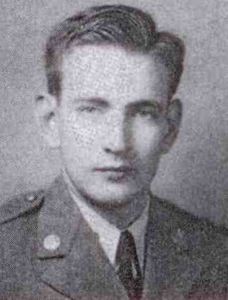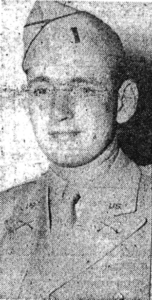Scroll of Honor – John Duncan McArthur, Jr.
“An All-Round-Fellow”
At least three Clemson men were on board the ship when it set sail from Southampton, England on the morning of Christmas Eve 1944. The ship was the Léopoldville, a Belgian transport that had made twenty-four Channel crossings and had already carried 120,000 Allied soldiers to France. On this particular voyage, Léopoldville was transporting two regiments of the American 66th Infantry Division plus a number of British soldiers. None of them would forget this Christmas Eve.
twenty-four Channel crossings and had already carried 120,000 Allied soldiers to France. On this particular voyage, Léopoldville was transporting two regiments of the American 66th Infantry Division plus a number of British soldiers. None of them would forget this Christmas Eve.
One of those on board Léopoldville as the last light faded from the winter sky was Second Lieutenant John Duncan McArthur, Jr. of Anderson, Clemson Class of 1944. McArthur and his division had arrived in England only a month earlier and were now being hurried to France to reinforce Allied lines in response to the Germans’ winter offensive that would come to be known as the Battle of the Bulge.
McArthur, son of Mr. and Mrs. John D. McArthur, Sr. of East River Street in Anderson, had graduated from Boys High School and enrolled in Clemson College in 1940. He had participated in extracurricular activities in high school and continued those pursuits on campus. A textile chemistry major, Johnny demonstrated leadership abilities early on. He was a member of Tiger Brotherhood, the Anderson County Club, the Pershing Rifles, the YMCA Cabinet and Phi Si, the textile honorary fraternity. He was also a member of the swimming team.
McArthur was assigned to Company D-2 in what was at the time the largest infantry ROTC cadet corps in the nation. By the time he began his junior year, Johnny was the cadet first sergeant of D-2. He would have expected to attend ROTC summer training at the end of the school year and then serve as  a cadet officer as a senior, but the War Department had other plans. By this time of course, the war was raging around the globe and Clemson men were serving in every theater. The demand for manpower—and especially for young leaders—was increasing rapidly as America continued the mobilization of manpower and industry. During the spring semester of 1943, the War Department announced that seniors would go directly into service following their graduations. McArthur and his classmates would forego their senior years on campus and go directly into basic training following the end of spring classes. Those showing aptitude would have the opportunity to advance to Officer Candidate School.
a cadet officer as a senior, but the War Department had other plans. By this time of course, the war was raging around the globe and Clemson men were serving in every theater. The demand for manpower—and especially for young leaders—was increasing rapidly as America continued the mobilization of manpower and industry. During the spring semester of 1943, the War Department announced that seniors would go directly into service following their graduations. McArthur and his classmates would forego their senior years on campus and go directly into basic training following the end of spring classes. Those showing aptitude would have the opportunity to advance to Officer Candidate School.
McArthur was, not surprisingly given his record as a cadet, one of those selected for officer training. He was sent to Fort Benning, Georgia for OCS and, following its successful completion, was commissioned a second lieutenant and assigned to the 66th Infantry Division, the Black Panthers, then training at Camp Rucker, Alabama. On the Sunday after Thanksgiving, November 26, 1944, McArthur’s regiment landed in Dorchester, England. Their pre-combat training was cut short by the Battle of the Bulge and the division was rushed to Southampton for its Christmas Eve crossing of the English Channel.
Léopoldville was just five miles from its destination, the French port of Cherbourg, when at 1754 hours, despite an escort composed of one French and three British warships, it was struck by a torpedo fired from a German U-boat. In the December darkness, Léopoldville began to sink. Neither the captain, who spoke Flemish, or his crew, most of whom came from the Belgian Congo, spoke English. Radio communications between ship and shore were also hampered by different frequencies. As a result, most of the men on board ended up in the frigid waters, struggling to survive until they could be rescued.
One of those in the water as the evening turned to night was Second Lieutenant McArthur.  According to a newspaper report, McArthur, the Clemson swimming letterman, paddled among the survivors of the sinking ship helping those who were wounded or who could not swim. Seven hundred sixty-two men were killed, including Clemson alumni William Ingram Lawrence and James Lee Loftis both of the Class of 1946, in the sinking of Léopoldville making it the second deadliest troop ship disaster in the European war.
According to a newspaper report, McArthur, the Clemson swimming letterman, paddled among the survivors of the sinking ship helping those who were wounded or who could not swim. Seven hundred sixty-two men were killed, including Clemson alumni William Ingram Lawrence and James Lee Loftis both of the Class of 1946, in the sinking of Léopoldville making it the second deadliest troop ship disaster in the European war.
Once they finally reached French shores and, on December 29 relieved the 94th Infantry Division, McArthur and the 66th were assigned to destroy by-passed pockets of German troops still remaining in northern France. Over the next two months, the 66th conducted limited attacks to gather intelligence and reduce the pockets of German resisters. On February 20, 1945, just eleven weeks before V-E Day, McArthur was killed in Germany.
McArthur was survived by his parents and two sisters. He is interred at Brittany American Cemetery, St. James, France. In reporting the death of one of the city’s sons, the Anderson Independent wrote “He was held in high esteem by all who knew him. Johnny was known as an all-round fellow and he will be missed by all who were fortunate in claiming him as a friend.”
For more information on John Duncan McArthur, Jr. see:
https://soh.alumni.clemson.edu/scroll/john-duncan-mcarthur-jr/
For additional information on Clemson University’s Scroll of Honor visit:
